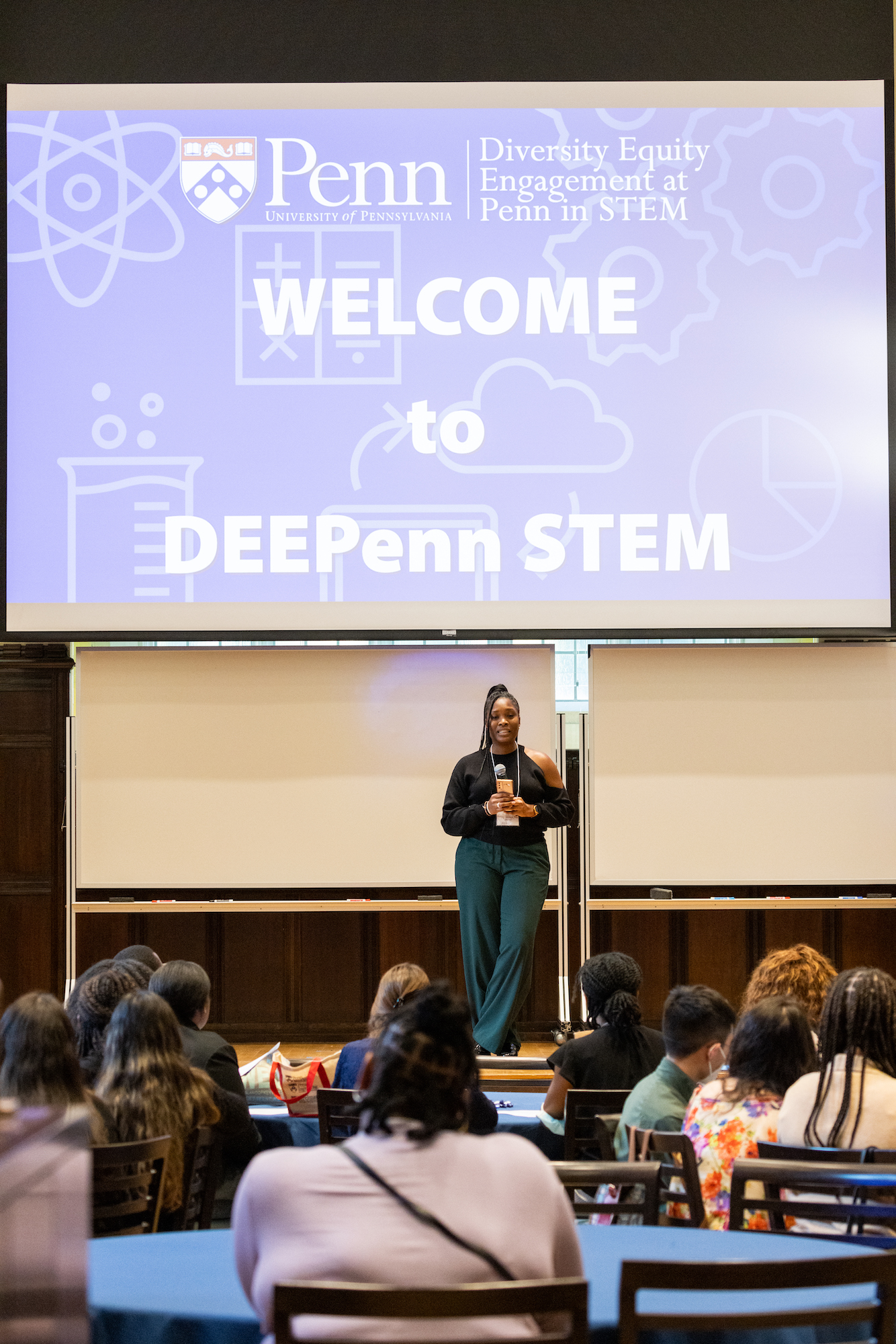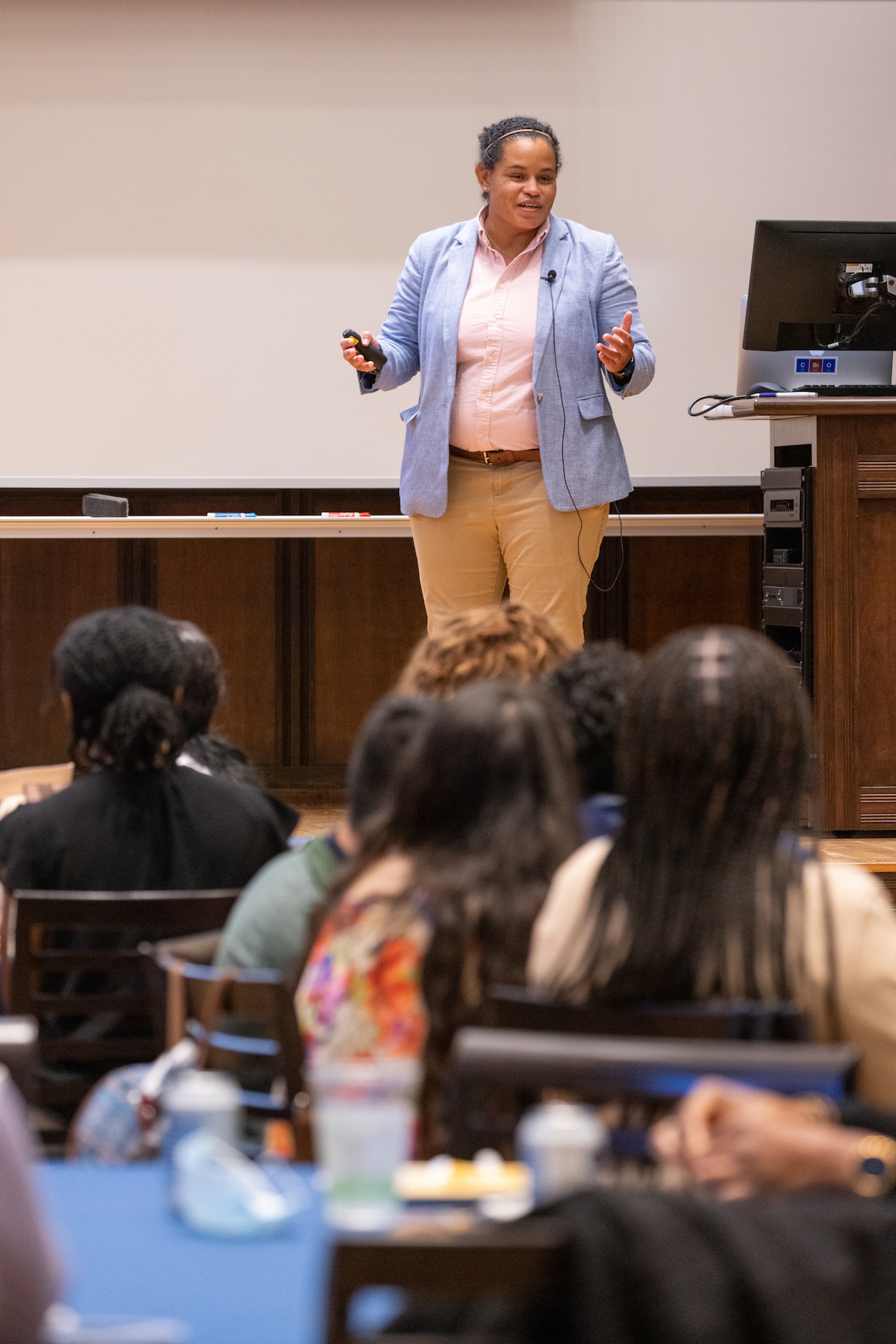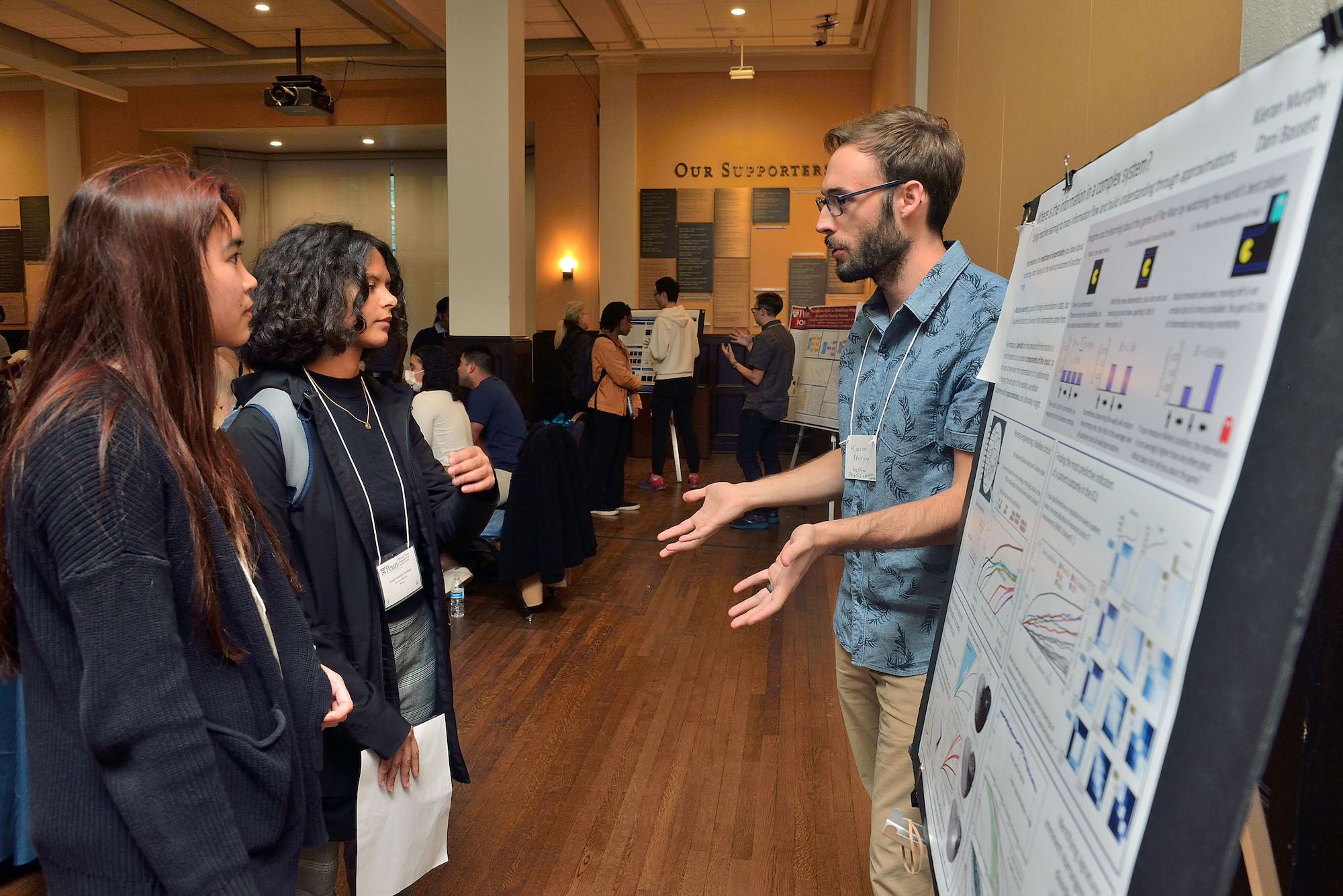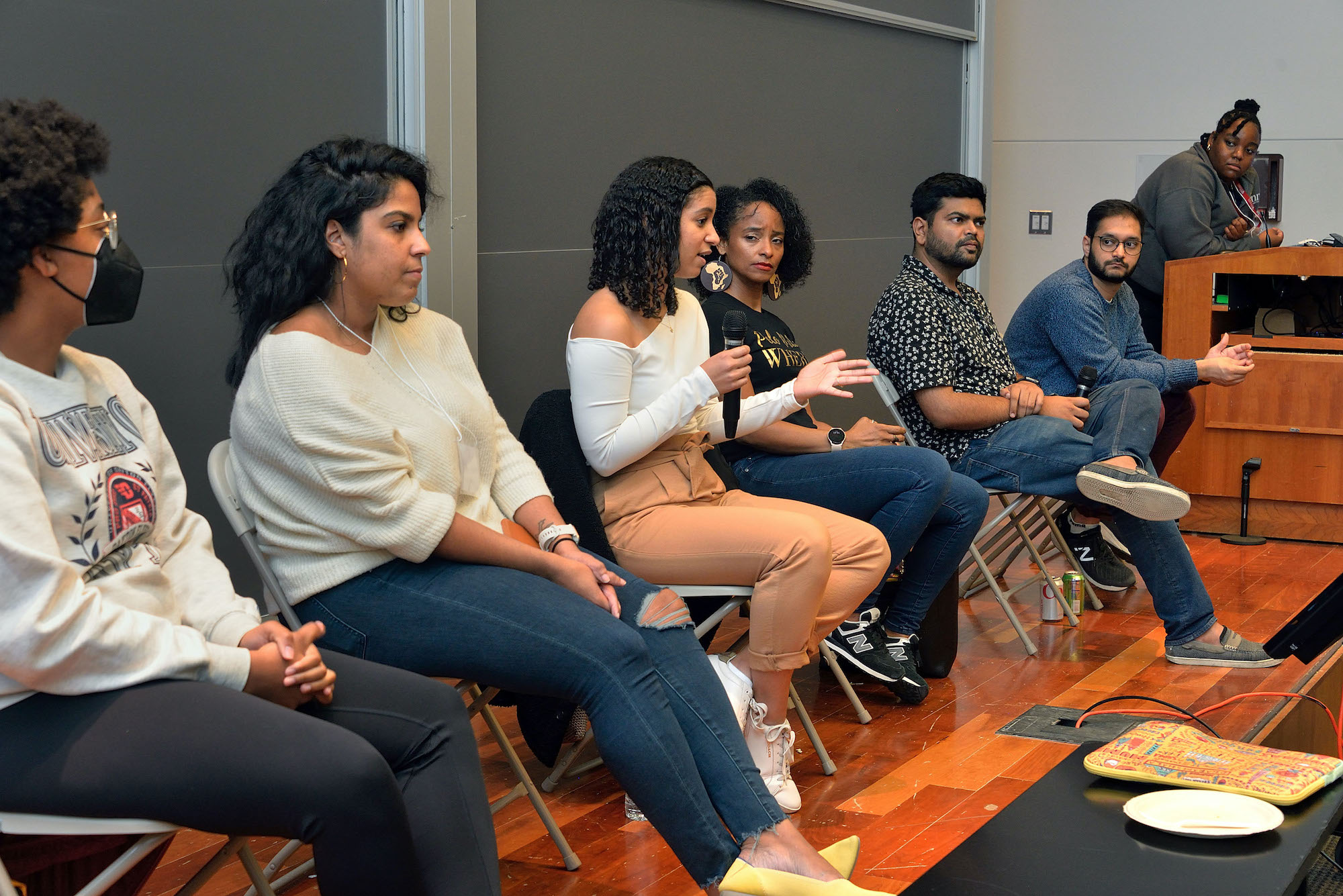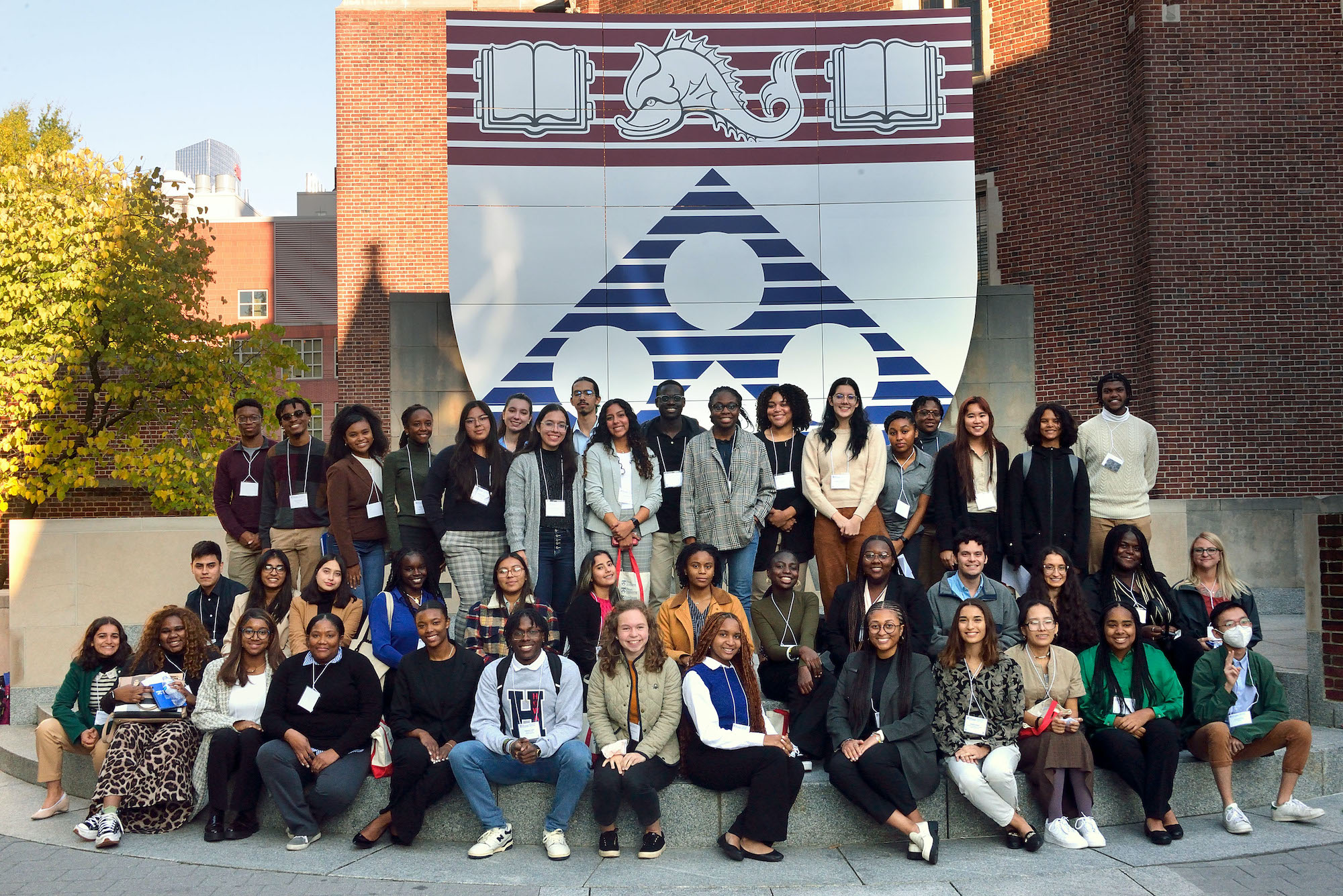
Pursuing graduate education in science, technology, engineering, math, (STEM) and related fields can open an array of career possibilities, from working in academia, health care, industry, and more. But applying to graduate school, and thriving once there, can sometimes seem like insurmountable obstacles, especially without role models to help lead the way.
The DEEPenn STEM initiative, short for Diversity Equity Engagement at Penn in STEM, aims to plot out a roadmap around and over these potential barriers, ensuring that college students belonging to groups historically underrepresented or marginalized in STEM can achieve advanced training and success.
Earlier this month, DEEPenn STEM welcomed 48 college students from across the United States to Penn’s campus, engaging them in three days of workshops, lectures, networking opportunities, lab tours, Q & A sessions, and a resource fair—all aimed at smoothing the path toward a graduate education.
“This effort grew out of noticing that there are a lot of students, especially when you’re talking about historically marginalized and traditionally underrepresented groups, that don’t really understand what graduate school is, how to get there, and what achieving an advanced degree can hold for them,” says Ashley Wallace, assistant director of education and outreach for the Laboratory for Research on the Structure of Matter.
Wallace and others from the School of Arts & Sciences (SAS), the School of Engineering and Applied Science (SEAS), and the Perelman School of Medicine (PSOM), coordinated across schools and centers in organizing DEEPenn STEM, in part to highlight the similarities and differences between the application process and opportunities at the University’s different schools.
All the participants’ travel, lodging, and food expenses were covered with support from SAS, SEAS, and PSOM as well as the Office of the Provost, the Center for Engineering MechanoBiology (CEMB), the Center for Sustainable Separations of Metals, the Laboratory for Research on the Structure of Matter (LRSM) at Penn, the Vagelos Institute for Energy Science and Technology, and the Center for Soft and Living Matter.
“We believe it’s important to have diversity in our programs, because diversity really brings out the best,” says Boon Thau Loo, associate dean for graduate programs in SEAS, who spoke to participants about the school’s admissions process. “Different people bring different ideas.”
Filling a need
Loo says over the four years he has helped oversee graduate programs at SEAS, “it was clear that our URM [underrepresented minority] representation was not where we wanted to be. But we also recognized that it’s not sufficient to get students to apply and be admitted; we also need to nurture them and make sure they succeed.”
DEEPenn STEM addressed both aspects of the graduate school process, and many more.
The effort emerged from a series of discussions from a cross-university group engaged in diversity, equity, and inclusion work around recruitment, retention, and support in STEM. Among many topics of conversation, this team shared a desire to recruit a more diverse population of students to Penn’s science and technology graduate programs. Thus began the seed for DEEPenn STEM.
The organizers recruited participants broadly, connecting with Historically Black Colleges and Universities (HBCUs), community colleges, and existing Penn STEM diversity programs, spreading the word on listservs, LinkedIn, and Instagram. They were gratified to have more than 170 students apply.
“It shows that there is a real interest in these types of programs, and a real value in offering them in years to come,” says Wallace.
Getting to know Penn, grad school, and each other
The 48 students selected to participate hailed from a broad geography, coming from as far away as California. Their STEM interests were also diverse, from biomedical fields to engineering.
Once on campus on Friday, Oct. 7, ice breakers cut through the nervous energy of the group, as students had to work together to respond to prompts like “Find someone whose birthday is today” and “Find someone who is in Philadelphia for the first time.”
Later in the evening, Donita Brady, a faculty member and assistant dean for inclusion, diversity, and equity in research training in PSOM, offered a keynote address to the group, sharing some of her personal journey into biomedical science and as well as key advice.
“I wanted to reassure them that they don’t have to have it all figured out just yet,” Brady says. “Everyone has their own journey. I also encouraged them to remember who they are and to find allies and sponsors and mentors in each environment they’re in to help them navigate the system.”
The weekend was carefully structured to help them develop that network of support. On Saturday morning, the group received welcomes from Camillo Jose (CJ) Taylor, associate dean of diversity, equity, and inclusion in SEAS, as well as from Kelly Jordan-Sciutto, a faculty member in the School of Dental Medicine and associate dean for graduate education in PSOM, Beth Wenger, associate dean of graduate studies in SAS, and Loo.
Practical, nuts-and-bolts sessions covered topics like how to prepare a CV, request letters of recommendations, navigate “Ph.D. life,” and develop a support network, leaving ample time for questions. Presentations from graduate student organizations and Career Services at a resource fair also gave students a flavor of opportunities available at Penn.
“One thing that was really terrific about this event—other than the students themselves, who were fabulous, engaged, and interested—was that it brought together faculty and staff and graduate students and postdocs who were really invested and did a lot of the organizing,” says Wenger. “I thought it was valuable for college students to see people at every level: to see grad students who they could relate to perhaps a bit more, and then postdocs and faculty, to get a real sense of the different stages of a career and where a graduate degree can take you.”
On Sunday, students were paired with a graduate student in a field that aligned with the undergraduates’ own interests for a lab tour and one-on-one mentorship.
“What I saw throughout the weekend was a lot of conversations about graduate student life and how to balance all the different things you feel you’re responsible for with all the things you want to do and you’re passionate about,” says Wallace. “To me these sophisticated questions were a testament to the fact that the students were coming away from the program with a solid introduction to what graduate school is going to entail, a growing awareness of what they need to do to succeed.”
Laying groundwork
DEEPenn STEM intentionally invited mainly second- and third-year undergraduates to attend, enabling them to get an early start on research experiences and the process of trial-and-error that can help narrow down what truly captivates their interest. The organizers also wanted students to get comfortable with Penn and Philadelphia, hopefully allowing them to begin to picture themselves here as graduate students.
“One of the things we often hear from students from underrepresented backgrounds is that Penn was not on their radar as a possibility,” says Brady. “Maybe they felt they wouldn’t belong at an Ivy League university. Our role is to say ‘no, you can apply, you can make it here.’ Getting them on campus, we can tell them about all the opportunities that could be ahead of them and the support structure that would be behind them if they come here.”
And while those who work in admissions at Penn would love to see a bump in applications from these and other talented students, the organizers see programs like this one as part of a longer-term investment.
“We hope they’ll consider us for summer REU [Research Experience for Undergraduate] opportunities or other internships and training programs,” says Loo. “It’s even OK if in the end they choose to go to a different grad school. Maybe in five to 10 years they’ll interview here as faculty. Success breeds success. We hope they’ll become the role models of the future.”
Considering this initial DEEPenn STEM weekend as a pilot, the organizers hope it’s the first of more such offerings, perhaps extending it to involve other STEM graduate programs on campus in future iterations.
“I’m really proud of the work we were able to do,” says Wallace. “It was a grassroots effort and required buy-in from leadership and interest that extended across the schools and centers involved. We always talk about how research is collaborative and how important it is for innovation to work together and build teams, and this is no different. We did something innovative, and it was brought to fruition because of teamwork, because of collaboration.”
Boon Thau Loo is RCA Professor and associate dean for graduate programs in the University of Pennsylvania School of Engineering and Applied Science.
Donita Brady is the Harrison McCrea Dickson, M.D. and Clifford C. Baker, M.D. Presidential Associate Professor and assistant dean for inclusion, diversity, and equity in research training in Penn’s Perelman School of Medicine.
Ashley Wallace is assistant director for education and outreach at the Laboratory for Research on the Structure of Matter.
Beth Wenger is the Moritz and Josephine Berg Professor of History and associate dean of graduate studies in Penn’s School of Arts & Sciences.
Key organizers of DEEPenn STEM also included: Annie Jeong, managing director of the Center for Engineering MechanoBiology; Christina Burton, director of graduate admissions for the School of Engineering and Applied Science; Lisa Lim-Pahl, assistant director for research training programs for the Perelman School of Medicine; and Pat Rea, associate director for admissions in the School of Arts & Sciences.




